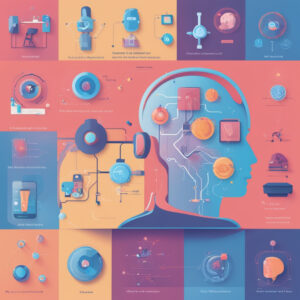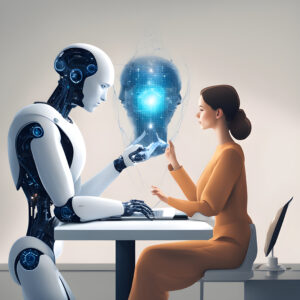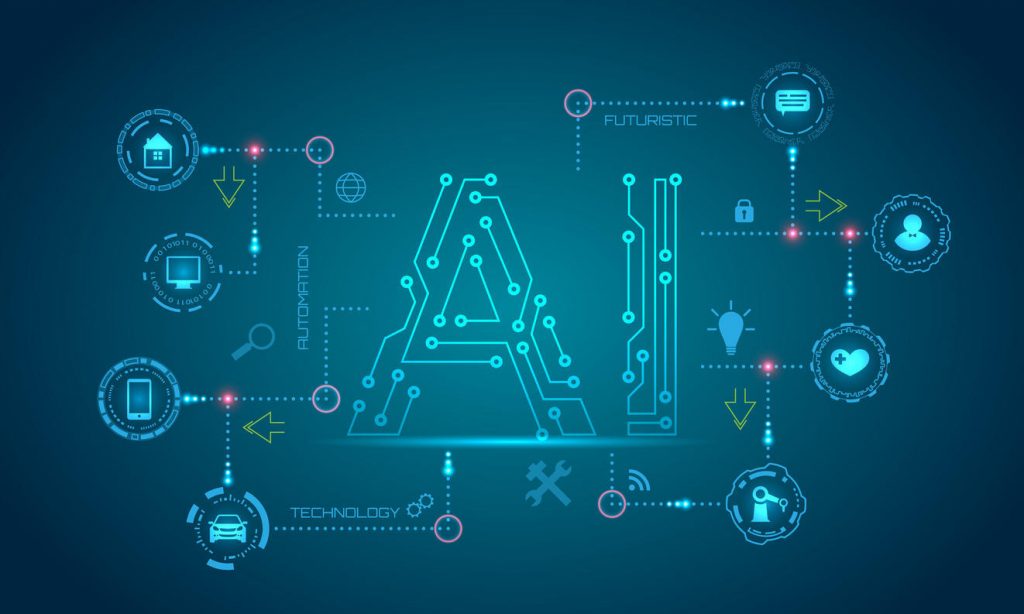Did you know that approximately 77% of devices today utilize Artificial Intelligence? 1 This staggering statistic underscores the pervasive presence of Artificial Intelligence technologies in our modern world, a trend that shows no signs of slowing. Amid this surge, there are a significant many who remain wary of AI’s unchecked advancement, citing ethical and social apprehensions. The main concern of which happens to be Artificial Intelligence and it’s integration into our society, such as the workplace or education system and possible repercussions of taking such actions. Additionally, there have been severe anxieties regarding privacy breaches and the potential for widespread misuse of AI-generated data wondering at large. However, amidst these concerns and worrisome ideas, it is vital for skeptics to acknowledge the countless positive impacts Artificial Intelligence can and has brought to society, fostering innovation and efficiency in various fields and studies. While concerns of the matter may be reasonable, it is vital for the world at large to discuss how and why such concerns are present if they are even valid in the long run.

Before delving into any discussion, it’s crucial to have an understanding of the subject at large. George M. Whitson highlights the nuanced nature of Artificial Intelligence (AI), stating, “Artificial intelligence is a broad field of study, and definitions of the field vary by discipline.” 2 As Mr. Whitson stated, the definition of Artificial Intelligence is multiplicative, subject to change based on interpretation and opinions based on who you might converse the topic with. Recognizing this variability is crucial when engaging in conversations about AI, as perceptions of the concept may diverge significantly among individuals. For the purpose of this article, Artificial Intelligence will be defined as the capability of computer programs to learn and demonstrate cognitive abilities effectively. Furthermore, the term “Artificial Intelligence” was initially coined by scientist John McCarthy in 1956, marking the beginning of a transformative journey for the field. Over the years, AI has undergone substantial advancements, now playing indispensable roles in various facets of daily life, from serving as virtual assistants to autonomously driving vehicles. Notably, an app that has recently surged in popularity within a short span is ChatGPT, an interface facilitating diverse user interactions. ChatGPT harnesses Artificial Intelligence to aid users in brainstorming ideas, comprehending complex subjects, receiving personalized recommendations, exploring emerging scientific research, coding, and so much more. 3 ChatGPT is used by millions of users across the globe daily, learning and evolving from each response inputted by the users. In so many ways Artificial Intelligence is evolving, and there is no stopping its growth now. As AI continues to evolve, it compels us to investigate its implications and devise strategies to navigate its rapidly evolving landscape efficiently and effectively. We hold all the power in determining the kind of tool that AI will become, this is especially true for ChatGPT as it public and nearly all information that is inputted becomes part of it’s information database, always learning. This compels us to consider the types of information we input to AI because once it’s there, there is no turning back. Additionally, we could find that AI revolutionizes the way we communicate. Similarly to the inventions of phones, computers, email, etc. we could find that AI also drastically changes how we communicate. We might find that we can just talk to a personal AI and have it send messages to the recipient. This would make electronic communication much more convenient and easy. AI could also advise us on how to communicate with each other physically and electronically. AI could record messages or watch over conversations and give tips on how to improve in certain areas. The applications of AI are nearly limitless. Furthermore, understanding the historical context and the exponential growth of AI can provide valuable insights into its current state and potential future trajectories, enabling us to adapt and harness its potential for positive impact across various domains. Moreover, staying informed about emerging technologies and ethical considerations surrounding AI development is essential for ensuring its responsible and equitable integration into society.

As artificial intelligence continues its relentless advancement, its integration into society yields possible consequences, especially when in reference to our societal infrastructure. This includes the looming threat of job displacement and substantial shifts in educational and skill requirements. Moreover, amid the promises of innovation and efficiency, there’s a persistent concern regarding Artificial Intelligence exacerbating inequalities, infringing on privacy, and potentially undermining fundamental human rights. Would you be alarmed to find that the previous two sentences were completely generated by an Artificial Intelligence, ChatGPT?! As said previously, the capability of Artificial Intelligence is rapidly evolving. Reflecting on the topic of Artificial Intelligence and its rapid succession since its inception is both astounding and somewhat concerning. As AI technology progresses swiftly, the boundaries of its capabilities will inevitably expand, gradually unveiling underlying threats. Garry Kasparov, Political Activist and Writer, astutely remarked, “For several decades we have been training people to act like computers, and now we are complaining that these jobs are in danger. Of course they are in danger.” 4 Kasparov’s perspective is not isolated; many share his apprehensions regarding AI’s potential to render numerous human professions obsolete. This collective anxiety surrounding AI’s impact on the workforce, education system, and broader societal dynamics is palpable. Additionally, given AI’s reliance on vast amounts of user-generated data, concerns about privacy breaches and cyberattacks are heightened. This renders AI systems prime targets for malicious actors, potentially escalating cyber warfare to unprecedented levels of threat. In 2023, there was an accidental data leak in which several Samsung employees entered top secret source code and company information into ChatGPT to get help with projects. The information was sent to the ChatGPT database where it could no longer be removed and the information is now retained within. 5 These are not isolated events, incidents like these are occurring in small companies and corporations around the globe, big and small. Data leaks are going to be at an all time high, and with this comes those who would like to exploit these leaks and incidents. Consequently, prioritizing cyber security becomes paramount in mitigating these risks. Safeguarding sensitive information and fortifying defensive measures must be integral components of any AI deployment strategy to preemptively address evolving cyber threats and ensure the resilience of AI ecosystems.

As daunting as the notion of AI supremacy may seem, its likelihood remains highly improbable, or at least not as dire as some portray it. Elon Musk remarked in an interview with UK Prime Minister Rishi Sunak, “AI will continue to have an impact on the way we work but it will not take away our jobs anytime soon…”, said Elon Musk in an interview with Prime Minister Rishi Sunak of the UK. 6 Musk also emphasized that with organizations prioritizing employee development, we might witness an improvement in work quality, leading to enhanced job satisfaction and ultimately boosting productivity. Additionally, researcher Tristan Cross highlighted the imperfections in AI’s current capabilities, particularly in tasks such as code debugging and development. Cross noted “Playing around with various chatbots, you’ll still experience the AI making a fair amount of mistakes.” 7, June 12, 2023]
Moreover, AI holds significant potential in healthcare, aiding in research, diagnostics, and therapy. However, it’s imperative to stress the ethical application of AI in healthcare and the necessity for collaboration between AI and human expertise. 8 Artificial Intelligence is still in its early stages, taking its baby steps in a sense, indepth. Previous research is being challenged in it’s application. It is highly unlikely that we will see a complete robotic takeover in the foreseeable future. While it is true that the evolution of AI is progressing rapidly, it is also true that it is growing based upon the information we give to it. Along with this it’s important to recognize that even ChatGPT, one of the most successful Artificial Intelligence programs known publicly, also contains key flaws. For example, in terms of complex math the AI will struggle issuing out correct information. At times it will also struggle with understanding literature as well as it will over or under analyze certain topics. Lastly, it also has trouble understanding social issues of varying types making it a less reliable source in some topics. These are all cautionary warnings for those who use ChatGPT, especially for students and employees who use the AI for inappropriate uses in educational/work environments. Although ChatGPT does contain some flaws still, that is not a reason to completely cut it out from your day to day activities. ChatGPT along with various other successful AI’s can be very convenient and helpful tools, they can help you research and get better understanding of topics, it is just important to keep in mind it may not be 100% fact. However, with that into consideration, we have a powerful opportunity to delicately nurture and develop AI into the tool we need it to be. By fostering its growth with ethical considerations we can ensure that AI becomes a valuable asset on this journey towards a brighter and more prosperous future. This collaboration between humans and AI holds the potential to revolutionize industries, enhance productivity, and address complex challenges facing society. Together, we can harness the capabilities of AI to drive innovation, creativity, and positive change on a global scale.

The trajectory of Artificial Intelligence (AI) appears unstoppable, its exponential growth promising unprecedented advancements. While many find this rapid evolution exhilarating, others harbor deep-seated apprehensions about its potential ramifications. It’s imperative to acknowledge both perspectives and collaborate to navigate the challenges ahead. The tension stemming from fears of AI-induced job displacement and educational upheaval is real. Yet, in addition to the apprehension lies the opportunity to forge symbiotic relationships with AI, leveraging its capabilities to create something truly transformative. Indeed, the journey ahead is fraught with complexity, where ethical considerations and societal frameworks will play pivotal roles in shaping AI’s trajectory. Embracing this collective responsibility, we can chart a course that harnesses AI’s potential while safeguarding against its pitfalls, ensuring a future that is not only technologically advanced but also ethically sound and socially equitable.
- Simplilearn. 2023. “Top Artificial Intelligence Stats You Should Know About in 2024.” Simplilearn.Com ↵
- Whitson, George M., III, BS, MS, PhD. 2023. “Artificial Intelligence.” Salem Press Encyclopedia of Science ↵
- Greene, Jim, MFA. 2023. “ChatGPT (Software).” Salem Press Encyclopedia of Science ↵
- Gale Business Insights: “AI taking jobs across board, says Kasparov.” Times (London, England), February 26, 2020, 22. ↵
- Priya Singh, Samsung employees accidentally leaked company secrets via ChatGPT: Here’s what happened, April 13, 2023 ↵
- Gale OneFile: News “Musk ‘sensationalist’ comments on AI taking jobs ‘not helpful’; Professor Emma Parry said it was right to suggest AI would change the workplace, but not in such a dramatic fashion in the short-term.” Independent -Online, November 3, 2023 ↵
- Tristan Cross, Gale Business “When I lost my job, I learned to code. Now AI doom mongers are trying to scare me all over again; Silicon Valley wants to make us believe humans are predictable and our skills replaceable. I’ve learned that’s nonsense.” Guardian [London, England ↵
- Di Nuovo, A. 2024. “Letter to the Editor: ‘How Can Biomedical Engineers Help Empower Individuals With Intellectual Disabilities? ↵



17 comments
Nicholas Pigott
Hi Maximus! Great article on a very new topic, and one that’s hard to cover and predict. Your article does a fantastic job at exclaiming the volatility of AI and its progress, with so many unknown variables. It’s a scary topic, but one we can’t ignore as it will change the world around us. I completely agree with your assessment in that we can harness its power for good when we hold responsibility.
Sebastian Hernandez-Soihit
Very good article and does a great work at contextualizing the reader into the current state of artificial intelligence and it’s current direction. pictures could have been more related to the reading but the serve building the atmosphere. Very good information handled and writing techniques, great job!!
Maria Fernanda Guerrero
I love learning more and more about AI. It’s mind blowing what AI can do. As for myself I use Chat GPT daily and it’s an incredible tool, yet it does have its limitations. I wonder if we will ever get to a point where we can perfect an AI generator like Chat GPT since like you mention it has its flaws. Nonetheless, great article and congratulations on your nomination!
Madison Hinojosa
I thoroughly enjoyed reading the article as it provided valuable insights into the versatile applications of Chat GPT. It is fascinating how Chat GPT can be utilized not only for seeking assistance but also for a multitude of other purposes. From simplifying daily tasks to enhancing productivity, the potential of AI, particularly Chat GPT, seems limitless. With each passing day, the field of artificial intelligence is evolving rapidly, pushing the boundaries of what technology can achieve. The continuous growth and advancement in AI are reshaping various industries and revolutionizing the way we interact with technology.
Maximus Escobedo
I couldn’t agree more! Me and so many others are excitedly waiting to see just how AI will evolve, revolutionizing our world as it evolves, and for the better!
Leaya Valdez
This is a really great read! This article rally ties in very important points that do affect us since AI is becoming fairly popular in todays world, the way you included Chat GPT and as one of the main focus is very interesting and can help a lot of us relate to what you said since chat GPT is one of the more well known AI programs.Using AI does have its positives which you did state i find it very interesting that you stated the negatives and even mentioned some worries people have with AI.
Martin Martinez
I do not think AI has advanced enough to warrant panic, although I understand those who are concerned about its abilities. We now have AI that generates realistic footage of video prompts. Defamation can ensue, possibly raising some future First Amendment questions. But generally speaking, I think that as long as people use it only as a tool, and do not rely too heavily on it, it can be very useful.
Maximus Escobedo
I completely agree, AI is nothing to lose sleep over! Yes, there will come consequences with it’s implementation into our society, but in all honesty, what technologies haven’t?! Smart phones have made it easier to indulge in academic dishonesty, the internet is a gold mine for cyber hackers, the list goes on and on. But still, the world hasn’t fallen apart!
Luis Ramirez
A very well-written piece! When reading your article I loved the example you used which was Chat GPT. You make an excellent point about how Chat GPT can be used to help out when things get challenging and you don’t know what to do. I also like how you include the negatives of AI and what the possible future may look like just because of the way AI is evolving today.
Luis Ramirez
I’m fascinated with your article, and I agree with you on how AI has been a good resource to students. However, with great power comes great responsibility. While AI holds the promise of enhancing learning experiences and streamlining tasks, it also presents opportunities for misuse and academic dishonesty. Students, in some cases, may resort to leveraging AI for shortcuts, rather than engaging with the material authentically.
Maximus Escobedo
Yes, it is unfortunate how such a useful tool can be exploited in inappropriate ways. We sadly cannot change how everyone uses AI, however I’d like to add that AI is not excluded from technology being used inappropriately. There are a large quantity of students who inappropriately use phones and the internet as a shortcut.
krivera16
Really informational and interesting article. Honestly, sometimes I wonder how our lives will be more so in the future if all this artificial intelligence keeps growing. Sure, most of the time it’s very useful, but sometimes students use it for the worst instead of the good. It’s just so crazy how a couple of years ago, AI was basically nothing, and now it’s a useful tool and resource that students go to.
Maximus Escobedo
I couldn’t agree more, it is extremely useful and because of that it can be a double edged sword for those who use it inappropriately. However, if it helps at all, a lot of the technology we use today could be used against us if we use it inappropriately. We all just need to understand the limits of not only AI, but also ourselves and figure out how to use this tool appropriately.
Ana Barrientos
Hi, Maximus! I really liked your article and it is relevant to the times now. What I found interesting is that 77% of devices use AI. I think AI has expanded a lot especially Chat GPT that we have incorporated using it in classes now for ideas and help. I do think people do have a fear that AI will take over our jobs, but I agree with Elon Musk I don’t think that will happen anytime soon but who knows. Overall, great job!
Maximus Escobedo
Hello Ana, thank you for the compliments! I completely agree, the proportions of AI today is mind boggling. Even here at St. Mary’s, professors have found ways to implement ChatGPT and AI as a tool to help us grow ideas.